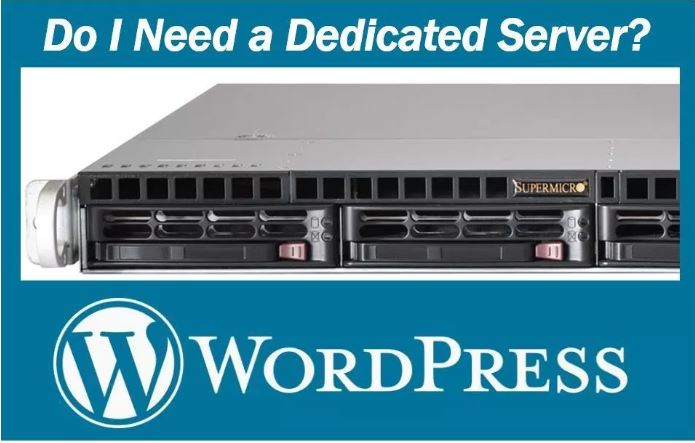
When you’re starting a business, the question of web hosting needs is one of the first ones to come up. So before we get any further, be assured that you can change your mind later. You can always migrate your domain name to a different hosting plan if you guessed wrong. But the purpose of this article will be to take the guesswork out of making this choice, naturally.
What’s the Difference?
Websites are hosted on a special kind of computer called a “server.” These look somewhat like a typical desktop computer, but with less emphasis on monitor and input devices, since a server’s first job is to face the web and talk to other computers. In a typical managed dedicated hosting scenario, servers are housed in racks, sometimes rows of racks. A dedicated server has one of these computers all to itself, used for just one website.
Your typical website, for small businesses at least, is tiny. Since a website is composed mostly of text files (HTML, CSS, SQL database), a few megabytes can be all the storage a website needs. Also, your typical website may not need to have massive bandwidth. A server is capable of handling many requests from other computers linking to it.
For this reason, many web hosts offer shared hosting. On a shared server, as the name implies, many websites are housed on just the one server. Just like carpooling in a vehicle, it’s more efficient to house several websites on one machine, as long as none of those sites are particularly demanding of resources.
But suppose one of those websites takes off in popularity and begins drawing lots of traffic? The next step up from a shared server is a virtual private server, or VPS. On a VPS, your website still shares space with other websites on the same server, but it’s a smaller number of sites and their resources are partitioned so no one website hogs the bandwidth from any other.
Time4VPS, Lithuania’s largest web hosting provider, which supplies customers with web hosting, VPS services, and Internet address registration, has the following definition of VPS:
“VPS stands for Virtual Private Server. It is a virtual maching that an Internet hosting company sells as a service. The term VDS (Virtual Dedicated Server) has a similar meaning.”
If a website is too busy to even tolerate a VPS, then nothing less than a dedicated server will do.
There are a couple other hosting options worth mentioning here. Dedicated IP hosting uses an IP address unique to your web domain, so you don’t share your IP with other websites on the same server. Some hosts also offer half-way packages like managed WordPress hosting. In this case, you’re not even running a full website, just a WordPress install and the front page of your blog.
How To Tell If You Need A Dedicated Server
#1: Your website is too slow. This is the most crucial indicator that your needs have outgrown your original hosting plan. If your site frequently gets enough traffic that pages take a minute to load, your only way forward is to either upgrade your server resources or sacrifice traffic.
Traffic isn’t always the only thing slowing down your website. If your site serves up large media files, such as videos, it may need the extra bandwidth even though only a few visitors drop by at a time. If you’re running a service for third parties, such as team management tools like Slack, that can take up bandwidth even with just a few users at a time. Gaming websites are another large resource user, since they’re moving media files around in real-time for several users at once.
#2: You’re running out of storage space. While modern-day hard drives have hundreds of gigabytes of storage, that space can quickly get eaten up in large-scale websites.
Again, storing large files such as an MP3 music archive is one culprit of disk storage usage. Other kinds of sites needing a dedicated server could include resource-intensive operations like running a forum, chat room, or email service for third parties since you have a user base who can add content on their own. Social networks have this problem where the archives grow bigger every day.
#3: Your business is security-sensitive. Different tiers of web business have different security needs. If you are a sole proprietor with a portfolio website, as long as you make backups regularly, you don’t have much specific security needs. However, if you’re running an online store or third-party service where users trust you with their private data, your security needs may include SSL certificates, firewalls, protection from DDos, encryption, and more.
Put Your Users First
Studies have shown that over half of users give up on a web page if it takes just 3 seconds to load. That sounds like far too short a load time, but remember that we all browse many pages per day and take in information at such a rate that 3 seconds is a deal-breaker when visitors can simply go back to their Google search and try another site.
On the security side, the top priority for IT workers is data security. Consider that for any business handling your data, how many times do they have to be compromised before they lose your trust? That’s right, it takes just one time.
One concern for dedicated server hosting is that it uses a lot of energy. That is a valid problem when IT services consume so much of our planet’s resources. Sites like Green Geeks alleviate that problem, by offering eco-friendly web hosting as members of the EPA’s Green Power Partnership, and by having a carbon-reducing footprint.
If your website is not experiencing these “growing pains,” then your current web hosting package is probably on track.
Interesting Related Article:
What is a server? Definition and examples
